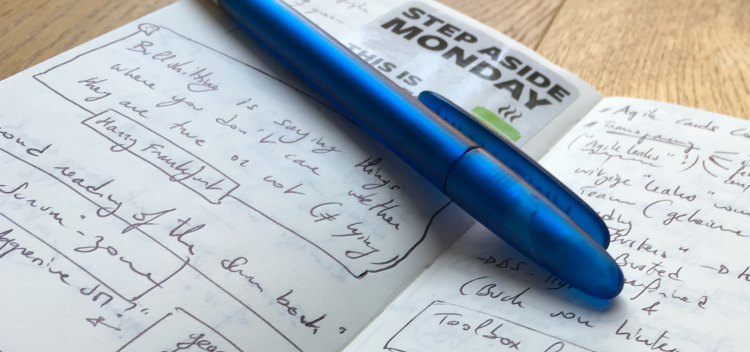
In the past few years I have spend a lot of time preparing and holding talks. And it's been so much fun, that I plan on doing it even more in the years to come.
But discussing with friends & colleagues and helping them build theirs, I realized there are a lot of misunderstandings and artificial fences that tend to scare some persons away from speaking publicly. I also realized I have built a big bag of tricks over the years, that makes the creation and presentation of a talk a lot smoother.
This series of articles is of course very subjective and not exhaustive at all. Feel free to suggest improvements!
Last but not least: why do I care so much about speaking publicly? In short: presenting makes you understand your weaknesses, learn and grow faster. For the longer explanation, head over to the DevJourney side.
This post will have multiple parts:
- Part 1: Gather ideas and imagine a talk
- Part 2: The call for paper
- Part 3: Prepare the talk
- Part 4: Rehearse
- Part 5: On stage
1. Gather ideas and imagine a talk
1.1. Be on the search, always!
On the long run, you should find a niche, an area of expertise to establish yourself into. It will help you focus and tremendously helps the marketing of your talks ... but until then - and in order to find this niche - experiment with every topic you like. Go wild! Really!
Have a "material for future talks"-notebook with you and remember to write things down regularly. I have a small notepad with me at all time and I use the "notes" app from my phone otherwise.
Don't underestimate the paper notepad, its Wife Acceptance Factor is waaaay higher than anything else and allows me to write things down all pretty much whenever I want without getting the get-off-your-phone-during-family-time-frowny-eyes
Remember, you rarely get a talk-idea off the bat. You notice things over time. By writing things down and reading them once in a while, you will discover trends, recurring ideas and ultimately examples and pieces to fill up your talks.
Whenever you see a common idea that could form a talk, try to consolidate those notes. From there on, I use a git repository on Bitbucket with one big text files per talk to consolidate the ideas, draft the talk and write the "call for paper" material (see below).
1.2. Form & Essence
In my opinion, there are 4 families of talks:
- Getting started: It is legitimate to "just" kickstart a topic. You put some time experimenting with a topic or even followed an online class? Well, that's enough for a start. Be honest about not being an expert and create an "intro-to-X" talk. If you can help me get in 1 hour what took you 20 to cover, you saved me 19 hours! THANK YOU!
- Experience Report: similar to the "getting started" talk, this one focuses on what you are doing or did. It is way more personal and is VERY well received in community conferences.
- Evangelizing: if you are an expert trying to get people on your bandwagon, what you are doing is evangelizing.
- Mix-and-match: Of course there is the obligatory combination of all those like an experience report on creating something and evangelizing it in the process.
Let's take an example: a software library.
- You can do a "getting started" talk on a library you discovered
- You can do an "experience report" on how you created this library
- You can "evangelize" a library you are an expert on
Each time, the focus is a bit different, and the expectation of the audience as well.
As a side note, my DevJourney talks are a mix of "experience report" and "evangelizing". It will most probably be more "evangelizing" once the book is written.
1.3. Consolidating the notes
Before going into the next phase, I like to fill most of the following checklist:
- Purpose: what I would like the audience to get out of the talk?
- Content: 3 to 5 ideas the talk should be built around
- Frame: where do I start and how far do I go? What is the minimum I expect from the audience? What is the most complex idea I want to transmit?
- Form: the format (see above)
- Style/Tone: the mise-en-scène, the theatrical frame of the talk and the tone. To give you an idea, here it is for two of my upcoming talks: "humorous and based on a Mythbusters theme" & "observing two sides of a coin like an angel and a demon sitting on your shoulders"
- Hook: a pop-culture reference or a joke I could use in a title
You don't have to have all of them. And of course they're not set in stone. But this should give you enough confidence to prepare the call for paper...
That's it for the first part. I hope you enjoyed it. The next part will be all about the Call for Paper (CfP).


![[Book] The phoenix project](/content/images/size/w400/2017/01/PhoenixHeader.jpg)
